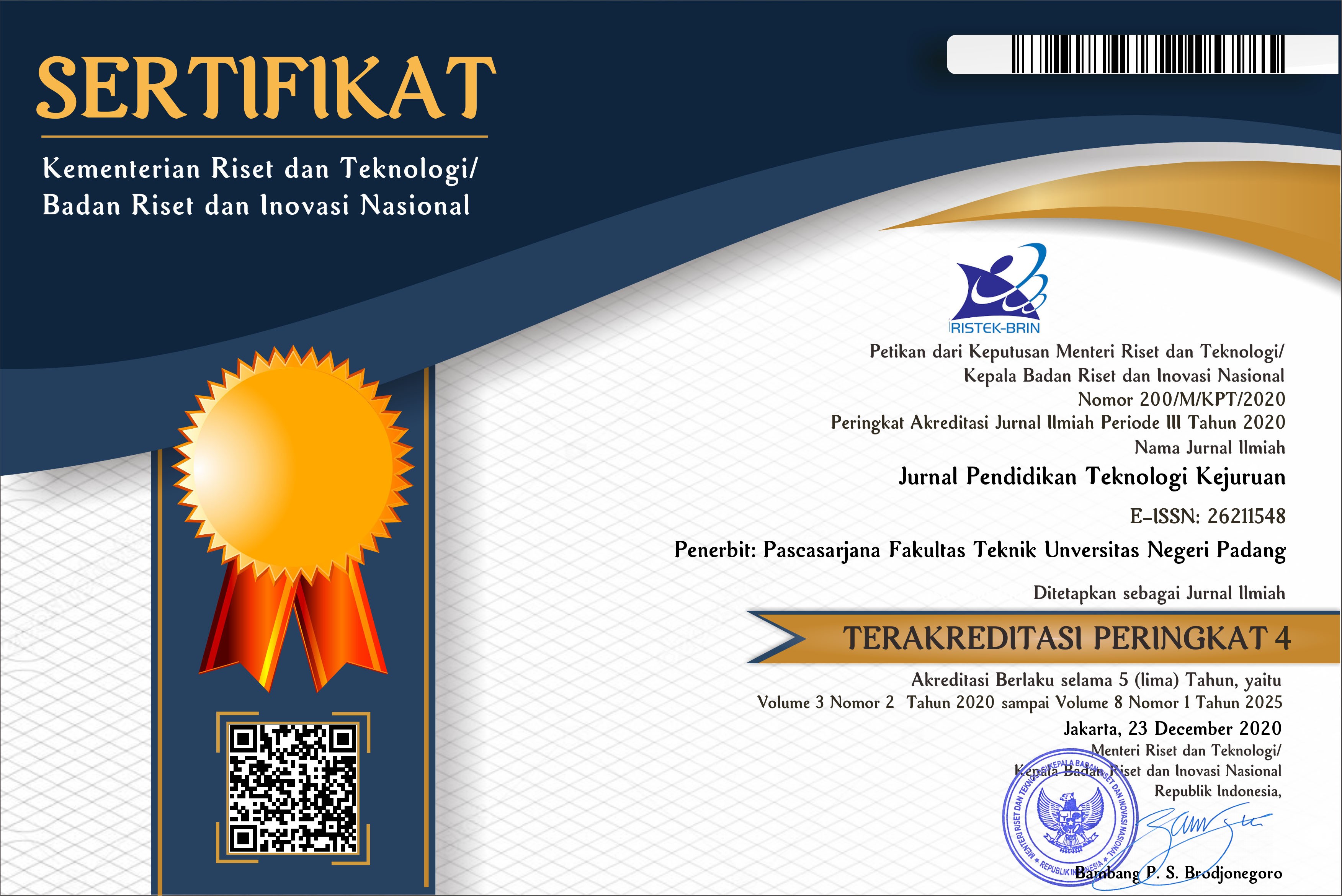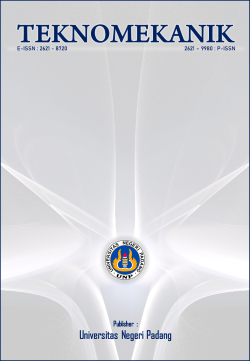Predicting graduate employment: the relationship among social skills, performance and motivation in cosmetology education graduates
Abstract
There have been many studies focusing on graduate tracing. However, they were still determining how likely the graduates will work following their interests and the fields of knowledge they have studied. This study aimed at gaining improved awareness of cosmetology education graduates' employment readiness concerning social skills, performance, and work motivation. This explanatory research used the entire research population of the last two years, as many as 70 graduates. Data collection was carried out using a questionnaire on each variable studied. While the analysis method used a structural equation model (Warp-PLS) to confirm the model's accuracy while testing the influence of variables on other variables and verifying that the instruments utilized were valid and dependable. The results proved that social skills, performance and work motivation directly and significantly affect graduate job readiness. Graduates' social skills and performance also affected job readiness in the field. The social skills of graduates were higher in influence than the performance and motivation of graduates in work readiness, with a difference of 0.391. These results implied a need to improve soft communication skills and spiritual provision in addition to the competencies that graduates already have.
References
Afriansyah, Walhidayat, Novendra, R., Harefa, L., & Sutejo. (2022). Usability Testing On Tracer Study System Using The Heuristic Evaluation Method. Journal of Applied Engineering and Technological Science, 3(2). https://doi.org/10.37385/jaets.v3i2.807
Ahmad, S. A., Ganefri, & Mukhaiyar, R. (2020). Relationship Between Motivation and Student Work Readiness At Smkn 1 Lubuk Sikaping. Jurnal Imiah Pendidikan Dan Pembelajaran, 4(April). https://doi.org/10.23887/jipp.v4i1.24174
Akbar, R., & Mukhtar, M. (2020). Perancangan E-Tracer Study berbasis Sistem Cerdas. Jurnal Sisfokom (Sistem Informasi Dan Komputer), 9(1). https://doi.org/10.32736/sisfokom.v9i1.631
Alfarisi, W., Gunawan Sudarsono, B., Studi Sistem Informasi, P., & Bung Karno, U. (2022). Rancang Bangun Aplikasi Tracer Study Berbasis Web Studi Kasus Pada Fakultas Ilmu Komputer Universitas Bung Karno. Jurnal Ilmiah Sistem Informasi, 2(1). https://doi.org/10.46306/sm.v2i1.20
Ananda, N. (2021). the Effect of Industrial Work Practices and Work Motivation on Work Readiness in Class Xii Smk Negeri 1 Kalianda. Jurnal Pendidikan Ekonomi, Perkantoran, Dan Akuntansi, 7(12). https://doi.org/10.21009/JPEPA.007.x
Ariva, A. P., & PuspitadewI, N. W. S. (2022). Hubungan Keterikatan Karyawan dengan Persepsi Kinerja Karyawan PT X di Masa Pandemi Covid-19. Character: Jurnal Penelitian Psikologi , 9(7).
Berestova, A., Kolosov, S., Tsvetkova, M., & Grib, E. (2022). Academic motivation as a predictor of the development of critical thinking in students. Journal of Applied Research in Higher Education, 14(3), 1041–1054. https://doi.org/10.1108/JARHE-02-2021-0081
Catacutan, K. J. A., Maramag, F. R. A., Bartolome, M. A., Hiquiana, R. M., & Mendezabal, M. J. (2020). Employability study of the business administration graduates of a catholic educational institution. Universal Journal of Educational Research, 8(1). https://doi.org/10.13189/ujer.2020.080119
Chigbu, B. I., & Nekhwevha, F. H. (2022). Academic-faculty environment and graduate employability: variation of work-readiness perceptions. Heliyon, 8(3). https://doi.org/10.1016/j.heliyon.2022.e09117
Cooper, J., Mitchell, D., Eckerle, K., & Martin, K. (2016). Addressing perceived skill deficiencies in student affairs graduate preparation programs. Journal of Student Affairs Research and Practice, 53(2). https://doi.org/10.1080/19496591.2016.1121146
Cuadra, L. J., Aure, Ma. R. K. L., & Gonzaga, G. L. (2019). The Use of Tracer Study in Improving Undergraduate Programs in the University. Asia Pacific Higher Education Research Journal, 6(1).
Dimitriadis, S., & Koning, R. (2022). Social Skills Improve Business Performance: Evidence from a Randomized Control Trial with Entrepreneurs in Togo. Management Science, 68(12). https://doi.org/10.1287/mnsc.2022.4334
Ferguson, H., Warwick, L., Disney, T., Leigh, J., Cooner, T. S., & Beddoe, L. (2022). Relationship-based practice and the creation of therapeutic change in long-term work: social work as a holding relationship. Social Work Education, 41(2). https://doi.org/10.1080/02615479.2020.1837105
Grant, A. M., & Shandell, M. S. (2022). Social Motivation at Work: The Organizational Psychology of Effort for, Against, and with Others. In Annual Review of Psychology (Vol. 73). https://doi.org/10.1146/annurev-psych-060321-033406
Hadiyanto, Noferdiman, Syamsurizal, Muhaimin, & Krisantia, I. (2021). Students' soft skills, hard skills, and competitiveness (SHC): A suggested Indonesian higher education curriculum model. International Journal of Learning, Teaching and Educational Research, 20(2). https://doi.org/10.26803/ijlter.20.2.12
Hyseni Duraku, Z., & Hoxha, L. (2021). Impact of Transformational and Transactional Attributes of School Principal Leadership on Teachers’ Motivation for Work. Frontiers in Education, 6. https://doi.org/10.3389/feduc.2021.659919
Lee, N. R., McQuaid, G. A., Grosman, H. E., Jayaram, S., & Wallace, G. L. (2022). Vocational Outcomes in ASD: An Examination of Work Readiness Skills and Barriers and Facilitators to Employment Identified by Autistic Adults. Journal of Autism and Developmental Disorders. https://doi.org/10.1007/s10803-022-05804-8
López Peláez, A., Erro-Garcés, A., & Gómez-Ciriano, E. J. (2020). Young people, social workers and social work education: the role of digital skills. Social Work Education, 39(6). https://doi.org/10.1080/02615479.2020.1795110
Makki, B. I., Javaid, M. U., & Bano, S. (2016). Level of Work Readiness Skills, Career Self-Efficacy and Career Exploration of Engineering Students. NFC-IEFR Journal of Engineering and Scientific Research, 4(1). https://doi.org/10.24081/nijesr.2016.1.0017
Maryani, Y., Entang, M., & Tukiran, M. (2021). The Relationship between Work Motivation, Work Discipline and Employee Performance at the Regional Secretariat of Bogor City. IJOSMAS : International Journal of Social and Management Studies, 2(2). https://doi.org/10.5555/ijosmas.v2i2.14
Muhammad Yousaf. (2019). Explanatory Research Definition, Explanatory Research Types, Comparison, Advantages, disadvantages. Scholarship Fellow.
Palma-García, M. de las O., Gómez Jacinto, L., & Hombrados-Mendieta, I. (2018). Reciprocal Relationship Between Resilience and Professional Skills: A Longitudinal Study With Social Work Students. Journal of Social Work Education, 54(3). https://doi.org/10.1080/10437797.2018.1474148
Portela-Pino, I., Alvariñas-Villaverde, M., & Pino-Juste, M. (2021). Socio-emotional skills in adolescence. Influence of personal and extracurricular variables. International Journal of Environmental Research and Public Health, 18(9). https://doi.org/10.3390/ijerph18094811
Prayogo, D., Hermanto, A. W., Widiatmaka, F. P., Prasetyo, D., & Sugiyarto, S. (2022). The Effect of Practical Experience, Knowledge of Job Opportunities, Teacher Professionalism and Work Motivation on Work Readiness. Jurnal Iqra’ : Kajian Ilmu Pendidikan, 7(1). https://doi.org/10.25217/ji.v7i1.2062
Ragusa, A., Caggiano, V., Trigueros Ramos, R., González-Bernal, J. J., Gentil-Gutiérrez, A., Bastos, S. A. M. C., González-Santos, J., & Santamaría-Peláez, M. (2022). High Education and University Teaching and Learning Processes: Soft Skills. International Journal of Environmental Research and Public Health, 19(17). https://doi.org/10.3390/ijerph191710699
Rochmayanti, F., Kuat, T., & Tentama, F. (2022). Effect of internship performance and work motivation on vocational students’ work readiness. International Journal on Education Insight, 2(2). https://doi.org/10.12928/ijei.v2i2.5553
Romadhoni, I. F., Susila, I. W., Rijanto, T., Miranti, M., & Megasari, D. S. (2023a). Stakeholder Opinions of The Students’ Abilities During the Research Internship Program. Jurnal Pendidikan Teknologi Kejuruan, 6(2), 90–97. https://doi.org/10.24036/jptk.v6i2.32223
Siburian, B., Afifah, S., Sinaga, P. T., & Marpaung, O. (2022). The Effect Of Soft Skill And Hard Skill On Work Readiness Of The 2018 STIE Jayakarta Students. Ijiems, 1(2). https://doi.org/10.52362/ijiems.v1i2.881
Sofiani, G., & Taman, A. (2019). The Effect Of Career Expectation, Career Guidance, And Work Motivation Toward Work Readiness Student. Jurnal Pendidikan Akuntansi Indonesia, 17(2). https://doi.org/10.21831/jpai.v17i2.28695
Supriyanto, S., Munadi, S., Daryono, R. W., Tuah, Y. A. E., Nurtanto, M., & Arifah, S. (2022). The Influence of Internship Experience and Work Motivation on Work Readiness in Vocational Students: PLS-SEM Analysis. Indonesian Journal on Learning and Advanced Education (IJOLAE), 5(1). https://doi.org/10.23917/ijolae.v5i1.20033
Tanaka, H., & Nakamura, S. (2022). The Acceptability of Virtual Characters as Social Skills Trainers: Usability Study. JMIR Human Factors, 9(1). https://doi.org/10.2196/35358
Tanti, M., Syefrinando, B., Daryanto, M., & Salma, H. (2020). Students' self-regulation and motivation in learning science. International Journal of Evaluation and Research in Education, 9(4). https://doi.org/10.11591/ijere.v9i4.20657
Trautner, M., & Schwinger, M. (2020). Integrating the concepts of self-efficacy and motivation regulation: How do self-efficacy beliefs for motivation regulation influence self-regulatory success? Learning and Individual Differences, 80. https://doi.org/10.1016/j.lindif.2020.101890
Urip, U., & Kuat, T. (2021). The Effect of Industrial Work Practice, Vocational Guidance and Achievement Motivation on Work Readiness of Students Accounting Department in Smk Majenang. Journal of Vocational Education Studies, 4(2). https://doi.org/10.12928/joves.v4i2.4777
Zheng, B., Chang, C., Lin, C. H., & Zhang, Y. (2021). Self-Efficacy, Academic Motivation, and Self-Regulation: How Do They Predict Academic Achievement for Medical Students? Medical Science Educator, 31(1). https://doi.org/10.1007/s40670-020-01143-4
Zheng, Y., Graham, L., Epitropaki, O., & Snape, E. (2020). Service Leadership, Work Engagement, and Service Performance: The Moderating Role of Leader Skills. Group and Organization Management, 45(1). https://doi.org/10.1177/1059601119851978
Copyright (c) 2023 Dindy Sinta Megasari, Arita Puspitorini, Dewi lutfiati

This work is licensed under a Creative Commons Attribution 4.0 International License.






